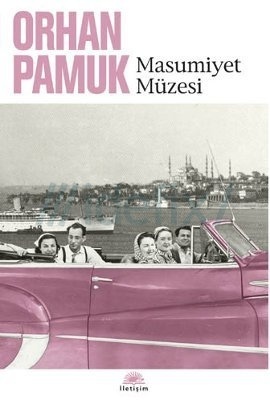You probably all know by now that I love lists. So, I was very happy when I found this
list of the supposedly 100 best novels by Modern Library.
So far, I have read only a few of them but there are quite a few on my TBR pile.
1. Ulysses - James Joyce
2. The Great Gatsby - F. Scott Fitzgerald
3. A Portrait of the Artist as a Young Man - James Joyce
4. Lolita - Vladimir Nabokov
5. Brave New World - Aldous Huxley
6.
The Sound and the Fury - William Faulkner
7. Catch-22 - Joseph Heller
8. Darkness at Noon - Arthur Koestler
9. Sons and Lovers - D.H. Lawrence
10. The Grapes of Wrath - John Steinbeck
11. Under the Volcano - Malcolm Lowry
12. The Way of All Flesh - Samuel Butler
13. 1984 - George Orwell
14. I, Claudius - Robert Graves
15. To the Lighthouse - Virginia Woolf
16. An American Tragedy - Theodore Dreiser
17. The Heart is a Lonely Hunter - Carson McCullers
18. Slaughterhouse Five - Kurt Vonnegut
19. Invisible Man - Ralph Ellison
20. Native Son - Richard Wright
21. Henderson the Rain King - Saul Bellow
22. Appointment in Samarra - John O'Hara
23. U.S.A. (trilogy) - John Dos Passos
-- The 42nd Parallel
-- 1919
-- The Big Money
24. Winesburg, Ohio - Sherwood Anderson
25. A Passage to India - E.M. Forster
26. The Wings of the Dove -
Henry James
27. The Ambassadors -
Henry James
28. Tender Is the Night - F. Scott Fitzgerald
29. The Studs Lonigan Trilogy - James T. Farrell
-- Young Lonigan
-- The Young Manhood of Studs Lonigan
-- Judgment Day
30. The Good Solider - Ford Maddox Ford
31. Animal Farm - George Orwell
32. The Golden Bowl -
Henry James
33. Sister Carrie - Theodore Dreiser
34. A Handful of Dust - Evelyn Waugh
35. As I Lay Dying - William Faulkner
36. All the King's Men - Robert Penn Warren
37. The Bridge of San Luis Rey - Thornton Wilder
38. Howard's End - E.M. Forster
39. Go Tell It on the Mountain - James Baldwin
40. The Heart of the Matter - Graham Greene
41. Lord of the Flies - William Golding
42. Deliverance - James Dickey
43. A Dance to the Music of Time (series) - Anthony Powell
-- A Question of Upbringing
-- A Buyer's Market
-- The Acceptance World
-- At Lady Molly's
-- Casanova's Chinese Restaurant
-- The Kindly Ones
-- The Valley of Bones
-- The Soldier's Art
-- The Military Philosophers
-- Books Do Furnish a Room
-- Temporary Kings
-- Hearing Secret Harmonies
44. Point Counter Point - Aldous Huxley
45. The Sun Also Rises -
Ernest Hemingway
46. The Secret Agent - Joseph Conrad
47. Nostromo - Joseph Conrad
48. The Rainbow - D.H. Lawrence
49. Women in Love - D.H. Lawrence
50. Tropic of Cancer - Henry Miller
51. The Naked and the Dead - Norman Mailer
52. Portnoy's Complaint - Philip Roth
53. Pale Fire - Vladimir Nabokov
54. Light in August - William Faulkner
55. On the Road - Jack Kerouac
56. The Maltese Falcon - Dashiell Hammett
57. Parade's End - Ford Maddox Ford
58. The Age of Innocence - Edith Wharton
59. Zuleika Dobson - Max Beerbohm
60. The Moviegoer - Walker Percy
61. Death Comes for the Archbishop - Willa Cather
62. From Here to Eternity - James Jones
63. The Wapshot Chronicles - John Cheever
64. The Catcher in the Rye - J.D. Salinger
65. A Clockwork Orange - Anthony Burgess
66. Of Human Bondage - W. Somerset Maugham
67. Heart of Darkness - Joseph Conrad
68. Main Street - Sinclair Lewis
69. The House of Mirth - Edith Wharton
70. The Alexandria Quartet - Lawrence Durrell
-- Justine
-- Balthazar
-- Mountolive
-- Clea
71. A High Wind in Jamaica - Richard Hughes
72. A House for Mr. Biswas - V.S. Naipaul
73. The Day of the Locust - Nathanael West
74. A Farewell to Arms -
Ernest Hemingway
75. Scoop - Evelyn Waugh
76. The Prime of Miss Jean Brodie - Muriel Spark
77. Finnegans Wake -
James Joyce
78. Kim - Rudyard Kipling
79. A Room With a View - E.M. Forster
80. Brideshead Revisited - Evelyn Waugh
81. The Adventures of Augie March - Saul Bellow
82. Angle of Repose - Wallace Stegner
83. A Bend in the River - V.S. Naipaul
84. The Death of the Heart - Elizabeth Bowen
85. Lord Jim - Joseph Conrad
86. Ragtime - E.L. Doctorow
87. The Old Wives' Tale - Arnold Bennett
88. The Call of the Wild - Jack London
89. Loving - Henry Green
90. Midnight's Children - Salman Rushdie
91. Tobacco Road - Erskine Caldwell
92. Ironweed - William Kennedy
93. The Magus - John Fowles
94. Wide Sargasso Sea - Jean Rhys
95. Under the Net - Iris Murdoch
96. Sophie's Choice - William Styron
97. The Sheltering Sky - Paul Bowles
98. The Postman Always Rings Twice - James M. Cain
99. The Ginger Man - J.P. Donleavy
100. The Magnificent Ambersons - Booth Tarkington
I agree with Thomas from the blog "
My Porch" who mentioned in his
list that the list is very white and very male. Maybe we will have to come up with a best list for all women.
So far, I read only
26 of these but it looks like a great challenge.

















